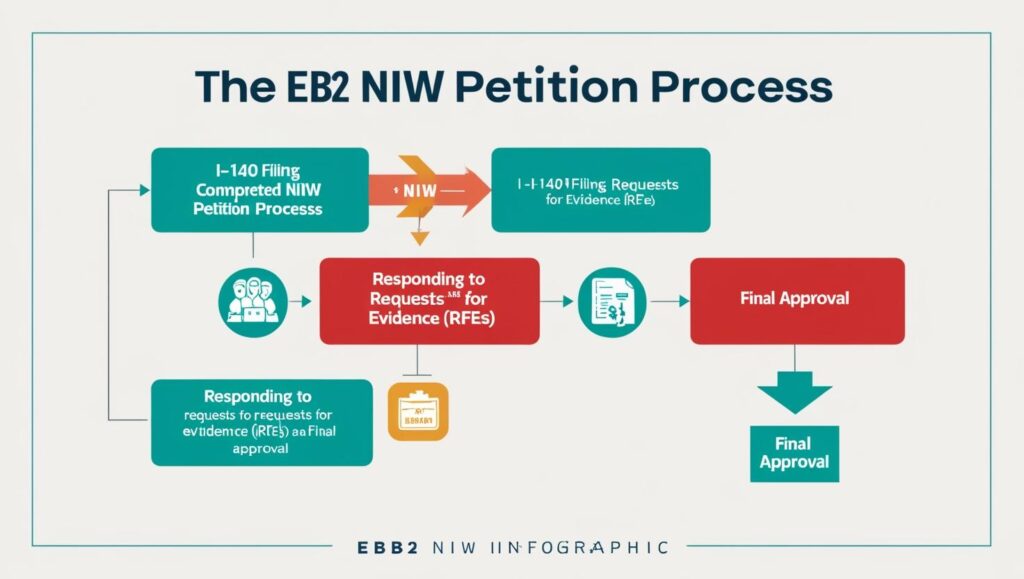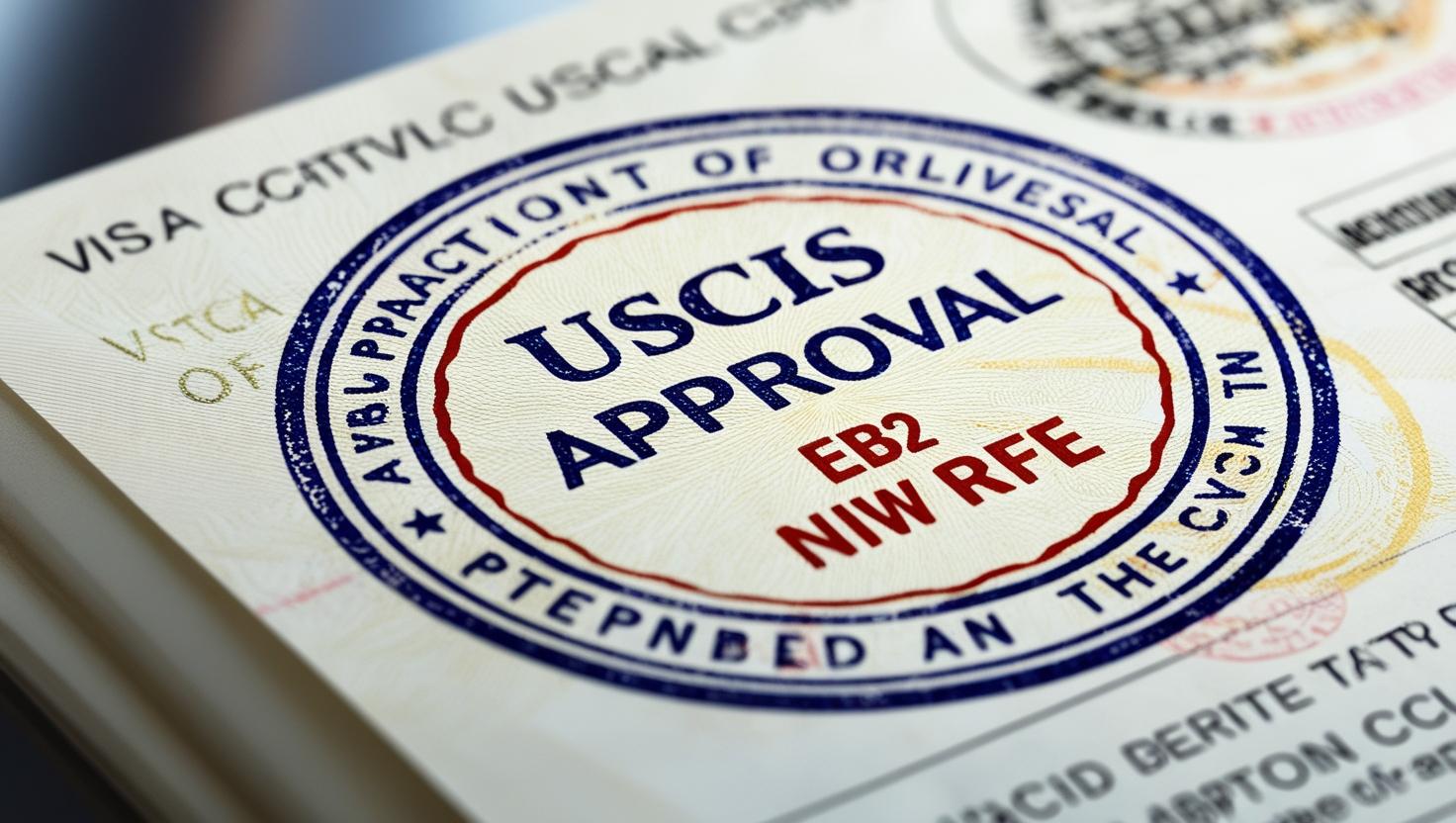The EB2 National Interest Waiver (NIW) is a popular employment-based visa category for foreign nationals seeking to work in the United States. This blog post addresses frequently asked questions about the EB2 NIW, providing insights into the petition process, approval rates, and key considerations for applicants.
What is the EB2 NIW?
The EB2 NIW, or Employment-Based Second Preference National Interest Waiver, is a visa category that allows foreign nationals to bypass the labor certification process if their proposed endeavor has substantial national importance. This waiver is particularly beneficial for individuals with exceptional abilities or advanced degrees. Read the Jan 2025 updated requirements of USCIS for more details.
Essentially, the new USCIS policy on EB-2 NIW clarifies that petitioners must first establish eligibility for the underlying EB-2 classification as either an advanced degree professional or a person of exceptional ability before qualifying for a National Interest Waiver (NIW).
It emphasizes a case-by-case evaluation of whether the proposed endeavor has substantial merit and national importance, whether the petitioner is well-positioned to advance the endeavor, and whether waiving the job offer and labor certification requirements benefits the U.S. overall.
The policy also provides detailed guidance on evaluating evidence, such as letters of support, business plans, and entrepreneurial ventures, while stressing that broad claims of economic or job creation benefits are insufficient without specific, well-documented proof.

Eligibility Requirements for EB2 NIW
To qualify for the EB2 NIW, applicants must meet specific requirements, including demonstrating exceptional abilities or holding an advanced degree. Additionally, the proposed endeavor must have national importance, and the applicant must show that waiving the labor certification process is in the best interest of the United States.
The Matter of Dhanasar Decision
The Matter of Dhanasar decision established the framework for evaluating NIW petitions. USCIS considers three factors: the national importance of the proposed endeavor, the applicant’s qualifications to advance the endeavor, and whether it would be beneficial to waive the labor certification process.
The Petition Process
Filing an EB2 NIW petition involves submitting Form I-140 to USCIS along with supporting documentation. This includes evidence of the applicant’s qualifications, the proposed endeavor’s national importance, and why the labor certification process should be waived.
Supporting Documentation
Applicants must provide documentary evidence that supports their petition. This may include academic records, proof of achievements, letters of recommendation, and evidence of significant contributions to their field.

Approval Rates and Challenges
The approval rate for EB2 NIW petitions varies depending on the quality of the application and the evidence provided. While the overall approval rate is encouraging, applicants should be prepared to address potential challenges, such as receiving a Request for Evidence (RFE).
Responding to an RFE
If USCIS issues an RFE, it is crucial to respond promptly and thoroughly. An immigration attorney can provide valuable guidance in preparing a strong response that addresses USCIS’s concerns.
Can You File Multiple Petitions?
Yes, it is possible to file multiple petitions, such as an EB2 NIW and an EB1-A, at the same time. This strategy can increase the likelihood of approval, as it provides multiple pathways to obtaining a green card.
Breaking Down 2024 EB-2 NIW Approval Trends
USCIS data for Fiscal Year 2024 reveals important patterns in the EB-2 NIW landscape. Here’s a snapshot of the key figures:
- Petitions Filed: 63,549
- Approved: 27,526 (43%)
- Denied: 11,256 (18%)
- Pending: 44,093 (69%)
It’s important to note that percentages are based on the total number of petitions received, and the figures don’t sum to 100% due to rolling cases from prior years. These cases may still be pending, approved, or denied.

Trends in Approvals, Denials, and Pending Cases
The 2024 data highlights a few critical trends:
- Increased Scrutiny: USCIS appears to be applying higher standards when evaluating petitions. This could be due to a rise in applications from individuals who may not fully meet the eligibility criteria or a general push for higher-quality submissions.
- Growing Backlogs: Pending cases surged from 22,756 in Q1 2024 to 44,093 by Q4. This increase may reflect a higher volume of Requests for Evidence (RFEs), delays in processing, or an influx of new petitions overwhelming USCIS resources.
- RFEs and Delays: The rise in RFEs suggests that USCIS is requesting more documentation to verify eligibility, which can slow down the approval process. Applicants should be prepared to respond promptly and thoroughly to RFEs to avoid further delays.
Approval Rates by Country of Birth
Approval rates for EB-2 NIW petitions vary significantly by the applicant’s country of birth. Here’s a breakdown of key statistics:
- China: 3,644 petitions received | 1,347 approved (37%)
- India: 2,501 petitions received | 740 approved (30%)
- Brazil: 2,003 petitions received | 310 approved (15%)
- Nigeria: 1,277 petitions received | 408 approved (32%)
- Iran: 1,131 petitions received | 397 approved (35%)
Brazil’s notably low approval rate highlights the importance of submitting a well-documented petition that meets USCIS standards. Applicants from all countries should focus on clearly demonstrating how their work serves the national interest and providing strong evidence of their qualifications.
Approval Rates by U.S. State
Geography also plays a role in EB-2 NIW approval rates. Here’s a look at how petitions fared across key states:
- California: 2,864 petitions received | 761 approved (27%)
- Texas: 2,059 petitions received | 660 approved (32%)
- New York: 2,054 petitions received | 336 approved (16%)
- Florida: 1,433 petitions received | 325 approved (23%)
- Unknown (likely international filings): 2,696 petitions received | 549 approved (20%)
New York’s low approval rate may indicate a higher number of poorly prepared petitions. Regardless of location, applicants should ensure their petitions are comprehensive and tailored to USCIS requirements.

Key Takeaways for 2025 Petitioners
The 2024 data underscores the importance of submitting a strong, well-prepared EB-2 NIW petition. Here are some actionable tips to improve your chances of success:
- Demonstrate National Interest: Clearly explain how your work benefits the United States on a national level. This is one of the most common areas of scrutiny in RFEs.
- Highlight Your Unique Qualifications: Provide robust evidence of your achievements and why you are uniquely positioned to carry out your proposed endeavor. Show how your qualifications exceed those of a minimally qualified worker in your field.
- Prepare for RFEs: Given the rise in RFEs, ensure your petition includes all necessary documentation upfront. Be ready to respond promptly and thoroughly if additional evidence is requested.
- Work with an Immigration Attorney: Consulting an experienced immigration attorney can help you navigate the complexities of the EB-2 NIW process and avoid common pitfalls. And if you want help with writing your recommendation letters and the main petition, Green Card For Alien can help. We only assist with the documentation and writing, not legal advice.
Conclusion
The EB2 NIW is a valuable option for foreign nationals with exceptional abilities or advanced degrees who wish to contribute to the United States’ national interests. By understanding the eligibility requirements, petition process, and potential challenges, applicants can increase their chances of success. Consulting with an experienced immigration attorney can provide additional guidance and support throughout the process.
FAQs
What is the EB-2 NIW and how does it differ from a regular EB-2 visa?
The EB-2 NIW (National Interest Waiver) is a subcategory of the EB-2 visa. While both fall under the employment-based second preference category, the NIW allows applicants to self-petition without a job offer or labor certification. This waiver is granted when the applicant’s work is deemed to be in the national interest of the U.S.
What are the main requirements for an EB-2 NIW petition?
The key requirements for an EB-2 NIW petition include: having an advanced degree or exceptional ability, proposing an endeavor of national importance, being well-positioned to advance that endeavor, and demonstrating that waiving the job offer and labor certification requirements would benefit the U.S. national interest.
What is the current NIW approval rate?
The USCIS NIW approval rate has dropped to 68% in Q3 of FY 2024, marking a significant decline from 90% in FY 2022 and 80% in FY 2023, the lowest rate since tracking began.
Can I apply for both EB2 NIW and EB1-A at the same time?
Yes, it is possible to file two petitions such as an EB2 NIW and EB1-A at the same time. This strategy can potentially increase your chances of approval, as each petition will be evaluated independently. However, it’s advisable to consult with an immigration attorney before pursuing this approach.
How long does the EB-2 NIW approval process typically take?
The processing time for an EB-2 NIW petition can vary significantly. On average, it may take anywhere from 6 to 18 months for USCIS to make a decision. However, processing times can be affected by various factors, including the current backlog and the complexity of your case.
Is a job offer required for an EB-2 NIW petition?
No, one of the main advantages of the EB-2 NIW is that it doesn’t require a job offer or labor certification. This allows foreign nationals to self-petition based on their qualifications and the national importance of their proposed endeavor.
What kind of evidence should I include with my EB-2 NIW petition?
Strong evidence for an EB-2 NIW petition may include: advanced degrees or exceptional ability credentials, publications, patents, citations of your work, letters of recommendation from experts in your field, evidence of the national importance of your work, and documentation showing how your work benefits the U.S. national interest.
Can a visiting scholar or researcher apply for the EB2 NIW?
Yes, visiting scholars and researchers can be eligible for NIW petitions if they meet the requirements. Their work must be of national importance, and they must demonstrate that they are well-positioned to advance their proposed endeavor. However, it’s crucial to ensure that applying doesn’t violate the terms of their current visa status.
Is hiring an immigration attorney necessary for an EB-2 NIW petition?
While it’s not mandatory to hire an immigration attorney for an EB-2 NIW petition (you can self petition), it’s often recommended due to the complexity of immigration law and the specific requirements of NIW cases. An experienced attorney can help strengthen your petition, ensure all necessary evidence is included, and navigate potential challenges in the application process. For writing recommendation letters and the main I-140 petition, you can use Green Card For Alien.

